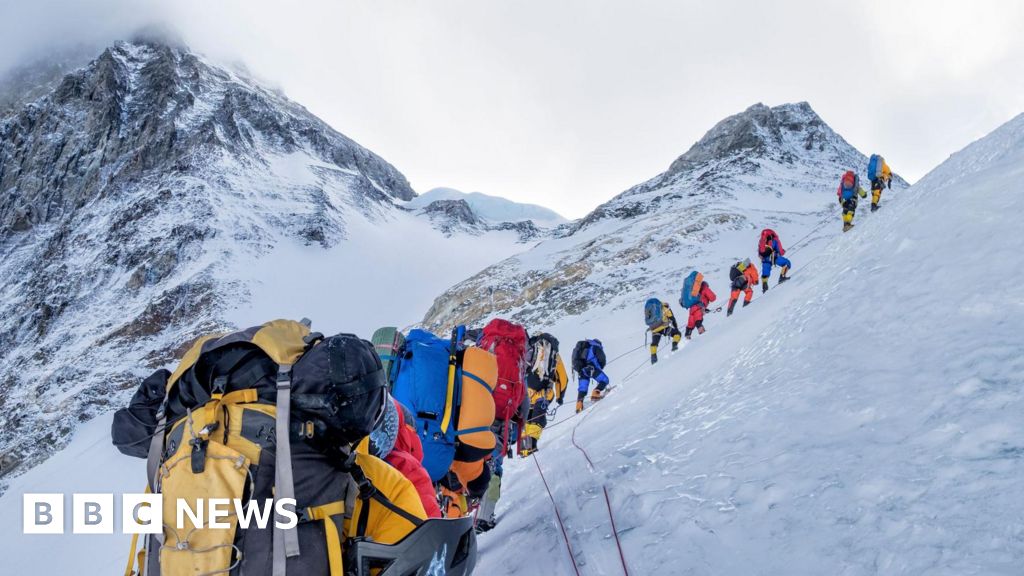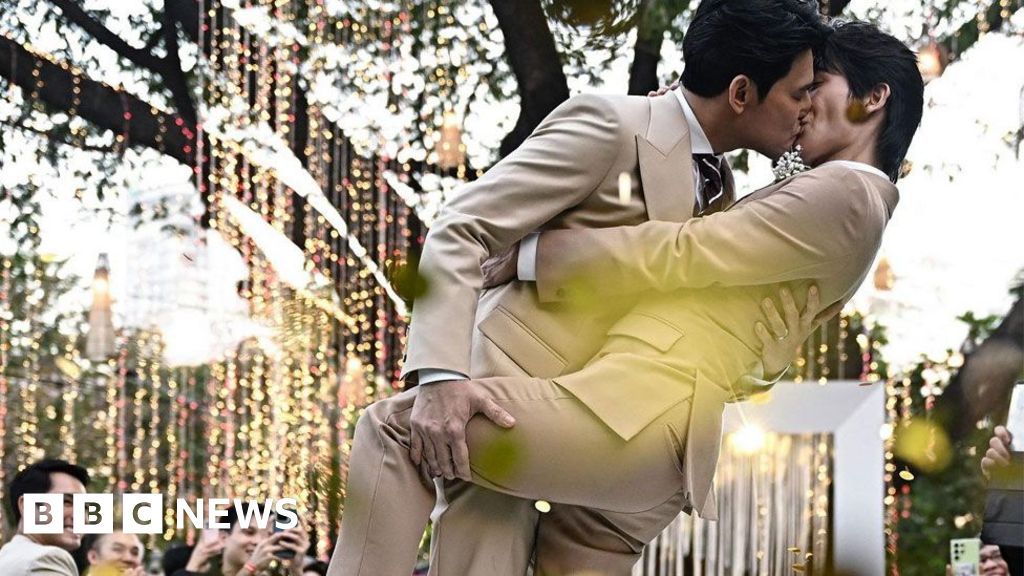ARTICLE AD BOX

Maj Oleh Kravchenko says nothing had prepared him for the brutality of the conflict
By Andrew Harding
BBC News, Eastern Ukraine
Maj Oleh Kravchenko has the sort of chuckle that's hard to resist - deep and treacly and mischievous.
"I'm still alive," he said, tilting his head to one side in his wheelchair, like a spectator marvelling at someone else's magic trick.
As Ukraine marks the second anniversary of the war, Kravchenko's turbulent story captures something of the journey so many people here - soldiers and civilians alike - have been on, as they've come to understand the sort of sacrifices and patience this long conflict is demanding of them.
Kravchenko is 50 years old now, and we're meeting for the third time since Russia launched its latest invasion of Ukraine. His beard - brown and trim when I first encountered him in the besieged Donbas town of Lysychansk in 2022 - is now straggly and grey.
We first met on a warm day in Lysychansk, in April 2022, having driven into the hilltop town on the last road still more or less under Ukrainian control. Kravchenko emerged from a doorway with a wry smile and offered to drive us around.
We raced off towards the frontlines in his car at furious speed, an automatic rifle at his side, and the sound of incoming artillery fire booming through the open windows.
"Look here. It's a crater from a Russian bomb," he said, playing the tour guide, as we skidded round another corner.
Maj Kravchenko uses a wheelchair after being injured in a Russian rocket attack
Kravchenko, in charge of the 57th Brigade's medical teams, took us to an evacuation point in the bombed-out ruins of an old factory, and then helped us sneak, without permission, past far more cautious officials, and into the main military hospital, where dozens of shell-shocked Ukrainian soldiers lay silently in their beds.
"A practical guy - unorthodox," one of his colleagues remarked about Kravchenko's style, with an indulgent smile.
Kravchenko had already seen plenty of war before the Russian invasion. After leaving his job administering a hospital in central Ukraine, he'd worked as a doctor for the United Nations, spending several years in Afghanistan, and visiting Somalia, the Democratic Republic of Congo and Sudan too.
But nothing had prepared him for the opening months of this conflict.
"Everywhere, blood, blood, blood," he said, as we stood beside a stack of blood-stained stretchers.
But in those early days he still seemed optimistic, convinced Ukraine could quickly win the war.
"Ukrainian soldiers are strong because it's our land. It's my country. My daughter, my son, are here. My heart is here," he said, his back straightening.
"I hope one, maybe one and a half months and we will shoot every Russian. Our soldiers will hold their positions. We will give the enemy a good fight."
Image source, Getty Images
Image caption,Maj Kravchenko and his men left Lysychansk only a few weeks before it was captured by Russian forces
We said our goodbyes and drove out of Lysychansk later that afternoon. The town was captured by Russian forces a few weeks later and remains in the Kremlin's control.
It would be a whole year before we ran into Kravchenko again, this time on the outskirts of Bakhmut, another frontline town, 50km (31 miles) to the southwest.
"Still alive," he said, by way of a greeting. It was something I'd begun hearing other soldiers say.
But his grin seemed forced. And the dark smudges of exhaustion below Kravchenko's eyes made him look like he was wearing stage paint.
"It's been difficult. I didn't sleep at all last night," he said, showing me around the small warehouse which his team had turned into a makeshift field hospital.
'I don't know about my fate'
It was the day before Yevgeny Prigozhin, the leader of Russia's Wagner group, launched his short-lived mutiny against President Vladimir Putin in July 2023.
Bakhmut itself had already fallen to the Russians weeks earlier, but Ukraine's much-heralded counter-offensive was in its early stage and there were strong hopes for its success.
Even so, the signs around Bakhmut were already looking ominous, with casualties from shrapnel and landmines being brought in with alarming regularity from the nearby trenches.
"So much heavy artillery," Kravchenko remarked.
As we sat outside, hiding beneath some trees to avoid Russian drones circling overhead, two incoming shells sent us diving for cover. The second failed to explode and Kravchenko dismissed it, with a short laugh, as a mere "fart."
But there was no disguising his unease.
"People are very tired. It's been a very heavy year," he said.
Then, unprompted, Kravchenko started to talk about his own future, a subject that must gnaw at so many minds after months spent in constant danger.
"I think about God and about fate. My fate is… hmm… I don't know," he said, explaining that he sometimes pictured himself after the war was over.
"[Until then] I'm just living and doing my job. I want to do it perfectly. I don't know about my fate."
Kravchenko was proud of how much experience his unit in the 57th Brigade had gained in combat medicine and talked about sharing that knowledge with other armies. His phone was full of videos showing recent operations he'd performed on soldiers with flesh torn apart by a range of missiles.
Image source, Getty Images
Image caption,Ukrainian soldiers are exhausted after two years of fighting
But then everything changed.
Late one evening, in October 2023, Kravchenko was working at the building he and his medical team had moved to, further west, near Izyum. They'd just been operating on a seriously wounded soldier and had put him in a vehicle ready for transport to a larger hospital. Kravchenko and three others went back inside to collect some equipment.
At 23:40, a Russian rocket hit the building.
"Svitlana had five children, and Yuliia had three. Vladyslav was never married. He didn't have children yet. He was 32," said Kravchenko, when we met this week for a third time.
A stern, haunted expression spread across his face as I asked him about the incident itself, and the death of his three close colleagues.
"It's too heavy. It's difficult for me," he said in a deep, gruff voice.
The same rocket that killed the others had brought a heavy pipe down on his own leg, smashing his left knee. Kravchenko had been taken to a hospital in Dnipro, then to Kyiv. Now he was back in his hometown of Kremenchuk, on the Dnipro River.
"President Zelensky gave me this one," he said, showing some of his medals and a pistol he'd also been given. Kravchenko is more or less confined to a wheelchair for the moment but can use crutches to get up one or two steps and is getting regular physiotherapy.
Since his injury, he has retired from the military, but remains in contact with his successor, a former dentist who also volunteered and joined the 57th Brigade.
"Leonidovych is a good man. Good company," said Ihor Babarykin, using Kravchenko's middle name as a mark of respect.
'The fear never goes'
The team has recently moved to a new base close to the town of Kupyansk, now being targeted heavily by Russian forces.
Last summer's counter-offensive had achieved little and Ukrainian forces have recently been driven out of Avdiivka. US arms supplies are running out and President Zelensky has warned that without more western help Russia will win.
"There are drones everywhere. And glide bombs. It has become so dangerous, but we're holding the line. We've grown accustomed to this work now. The fear never goes, but somehow you get used to it," said Babarykin. Three new casualties, all suffering from shellshock, lay quietly on beds nearby.
At his home near the Dnipro river, Kravchenko is wrestling with his new life out of the army.
"I would like to go back to my job on the frontline. But I cannot. I did my job well. After being wounded I want to start a new project for my country. A military hospital of my dreams. I know how to do it," he said, fidgeting, in apparent frustration, with the handles of his wheelchair.
Like so many Ukrainians right now, Kravchenko worries that the West may be losing interest in supporting the fight against Russia. "It will be a long war. Ukraine is the frontline of Europe. If we lose, after that it will be Poland and Germany and other countries," he said sombrely.
Kravchenko's military call-sign is "Afghan", in reference to his work abroad. But he's hoping that will change soon, if and when his knee heals.
"In one month, I will run like the wind. After that you will call me 'Wind'," he said, with something close to a chuckle.

 11 months ago
30
11 months ago
30








 English (US) ·
English (US) ·